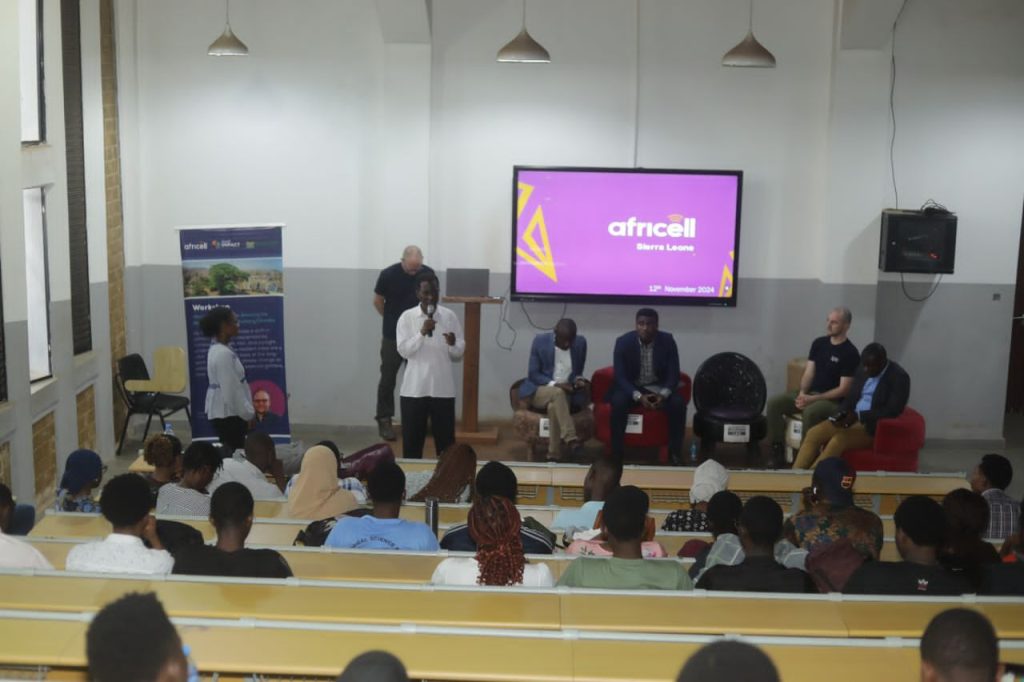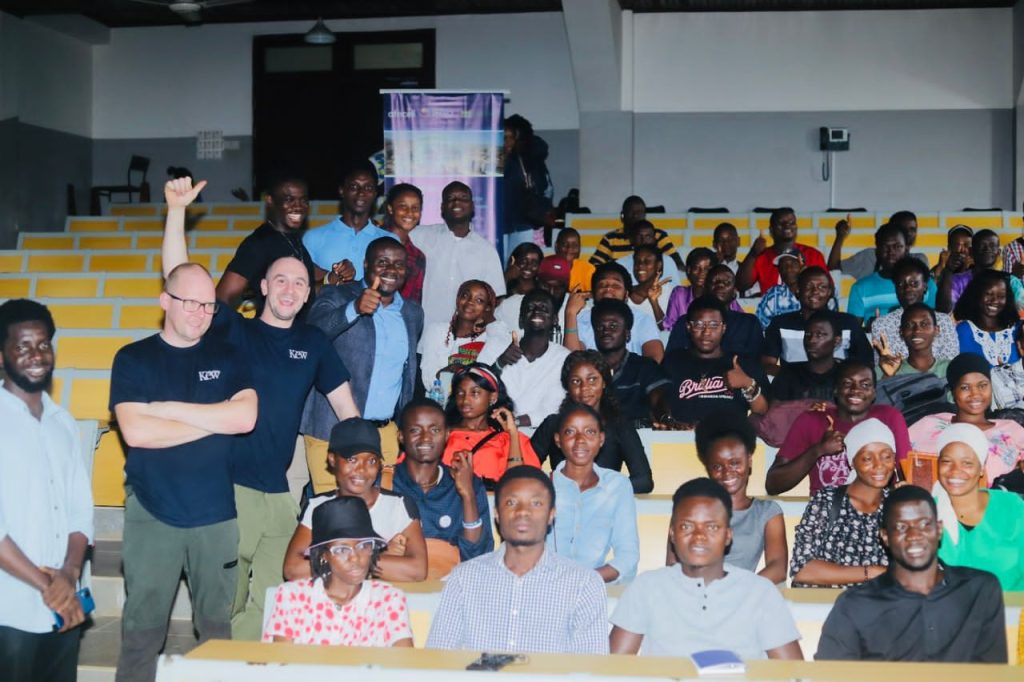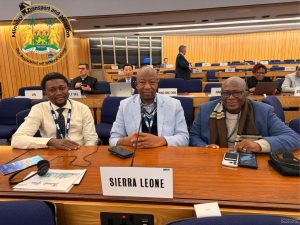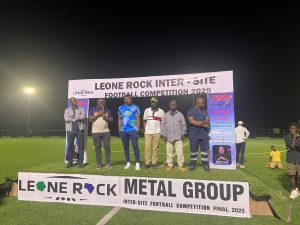Africell Supports Climate Awareness at Fourah Bay College Lecture

The Africell Impact Foundation, in collaboration with the Royal Botanic Gardens (Kew Gardens), recently hosted a public lecture aimed at empowering students from the Department of Biological Sciences at Fourah Bay College (FBC), University of Sierra Leone. The event, titled “Navigating the Future: Ensuring the Resilience of Trees in an Evolving Climate,” focused on the intersection of climate resilience and urban biodiversity, providing students with valuable insights on how to adapt to and mitigate the impacts of climate change.
The lecture, which targeted FBC’s Biological Sciences students, featured an engaging presentation by Kevin Martin, Head of Tree Collection at Kew Gardens, a world-renowned institution known for its botanical research and conservation efforts. Martin spoke extensively about the significant challenges posed by urbanization on both local and global climates, with a particular focus on the “urban heat island” effect. This phenomenon occurs when urban areas become significantly warmer than surrounding rural areas due to human activities, such as the heat emitted by buildings, vehicles, and industry.
“The global urban population now exceeds the rural population and is projected to surpass six billion by the 2050s,” Martin noted. “As cities grow, society and urban infrastructure will face increasingly severe climate challenges, driven both by greenhouse gas emissions and by the development of emerging urban microclimates,” he stressed. Martin’s message highlighted the need for cities to incorporate more green spaces, particularly trees, to help mitigate these effects and enhance climate resilience.
Andrew S. Fatoma, Chief Administrative and Human Resources Officer at Africell, also addressed the gathering, underscoring the company’s long-standing commitment to corporate social responsibility. Fatoma reflected on Africell’s nineteen-year history of supporting communities across Sierra Leone and its dedication to initiatives like the Africell Impact Foundation, which works to address pressing social and environmental issues.
“Africell’s impact is felt through initiatives like the Africell Impact Foundation and other humanitarian projects aimed at uplifting communities across Sierra Leone,” Fatoma said. “Our partnership with Fourah Bay College and other institutions is central to our vision, and we will continue to invest in programs that support the education and development of our future leaders,” he added.
Fatoma also reassured students that Africell is committed to enhancing the quality of its services, including improving internet connectivity, which is vital for students’ access to learning resources. He reaffirmed Africell’s dedication to providing reliable internet service, particularly for academic purposes, which is crucial in an increasingly digital world.

Dr. Okoni Williams, Head of the Department of Biological Sciences at FBC, spoke proudly about the strong relationship between his department and Kew Gardens, emphasizing the value of this collaboration for Sierra Leone’s academic and scientific community. Dr. Williams shared that one of his students had previously worked with Kew Gardens on research projects, including efforts related to plant conservation and biodiversity in Sierra Leone.
“Our department has strong ties with Kew Gardens, especially in projects like Bumbuna and Africa Minerals, which focus on environmental conservation and sustainable development,” Dr. Williams said. “These partnerships have been instrumental in advancing our research on plant science and environmental sustainability.”
Dr. Williams also highlighted a major achievement for the department: the discovery of a previously undocumented plant species in Sierra Leone. This breakthrough was made possible through the collaborative efforts with Kew Gardens, showcasing the importance of international partnerships in advancing scientific knowledge and conservation efforts.
In addition to reflecting on past successes, Dr. Williams also used the occasion to encourage students to take full advantage of the expert insights provided by Kew Gardens. He urged students to consider how they could apply this knowledge to address the pressing environmental challenges facing Sierra Leone, particularly in the areas of biodiversity conservation and climate change mitigation.
Dr. Williams also made a direct appeal to Africell, asking the company to improve internet connectivity on the Fourah Bay College campus. He explained that the campus’s challenging topography sometimes limits students’ ability to access online resources during lectures, making it difficult for them to engage with the wealth of digital learning tools available. Improved connectivity, he emphasized, would significantly enhance the academic experience for students and allow them to take full advantage of the digital age’s educational opportunities.
The event marked an important moment in the ongoing effort to build greater awareness of climate resilience and environmental sustainability in Sierra Leone. By bringing together international experts, corporate sponsors, and local academic leaders, the lecture highlighted the need for continued collaboration between the private sector, educational institutions, and the government to address the country’s environmental challenges.
The Africell Impact Foundation’s partnership with Kew Gardens exemplifies the kind of multi-stakeholder engagement that is critical for driving change in Sierra Leone. Through initiatives like this, students from Fourah Bay College are being equipped with the knowledge and tools needed to become the next generation of environmental leaders—capable of tackling the complexities of climate change and biodiversity conservation.
As Sierra Leone faces the dual challenges of urbanization and climate change, this event served as a timely reminder of the importance of education, innovation, and partnerships in creating a more resilient and sustainable future.





